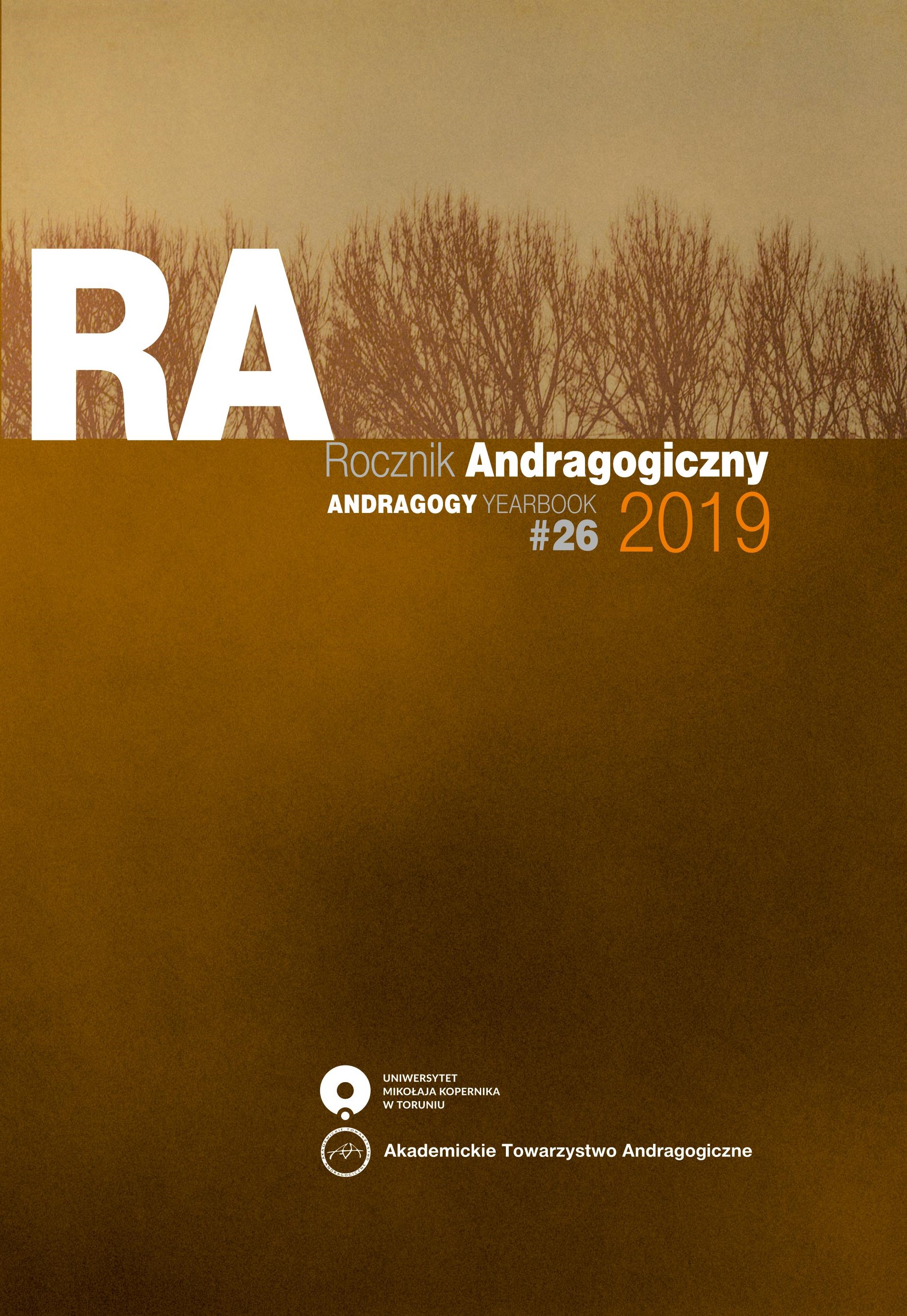Rozwój kreatywnego myślenia w wieku zaawansowanym w kontekście zapobiegania upośledzeniu funkcji poznawczych związanych z wiekiem: wybrane dane behawioralne i neuronalne
DOI:
https://doi.org/10.12775/RA.2019.011Słowa kluczowe
myślenie kreatywne, myślenie innowacyjne, trening kognitywny, neuroplastyczność, wiek zaawansowanyAbstrakt
Kreatywne lub innowacyjne myślenie może być rozumiane jako proces umysłowy prowadzący do powstawania nowych i użytecznych idei. Jest kluczową umiejętnością kognitywną pozwalającą skutecznie reagować na zmieniające się wyzwania życiowe. zachowanie tej umiejętności jako elastycznej i dającej się adaptować jest możliwe. W niniejszym artykule przedstawiam wybrane badania nad myśleniem innowacyjnym, których przedmiotem analiz był rozwój kreatywności i zdolności kognitywnych poprzez trening. Doniesienia z psychologii uzupełniane są danymi neurobiologicznymi, dzięki czemu podłoże behawioralnych efektów treningów innowacyjnego myślenia można wyjaśnić mechanizmami neuronalnymi zachodzącymi w mózgu, czyli mechanizmami neuroplastycznymi. Spostrzeżenie, że zachowanie i rozwijanie kreatywnego myślenia jest możliwe w starszym wieku, motywuje do podejmowania wysiłku w kierunku poznania i wykorzystania związków między innowacyjnym myśleniem a umiejętnościami kognitywnymi potrzebnymi w codziennym życiu; co z kolei może zapobiec związanemu z wiekiem uwstecznianiu procesów kognitywnych. Obiecujące modele treningów wzmacniających kreatywne myślenie oraz leżące u nich podstaw mechanizmy neuronalne nie przestają się pojawiać i udoskonalać.Bibliografia
Beaty R. E., Benedek M., Silvia P. J., Schacter D. L. (2016), Creative cognition and brain network dynamics, „Trends in Cognitive Sciences”, 20(2), p. 87–95.
Bressler S. L., Menon V. (2010), Large-scale brain networks in cognition: emerging methods and principles, „Trends in Cognitive Sciences”, 14(6), p. 277–290.
Chapman S. B., Spence J. S., Aslan S., Keebler M. W. (2017), Enhancing innovation and underlying neural mechanisms via cognitive training in healthy older adults, „Frontiers in Aging Neuroscience”, 9, Article 314, p. 1–11. doi.org/10.3389/ fnagi.2017.00314
George D. R, Houser W. S. (2014), „I’m a Storyteller!”: Exploring the benefits of TimeSlips creative expression program at a nursing home, „American Journal of Alzheimer’s Disease & Other Dementias”, 29(8), p. 678–684.
Goulden N., Khusnulina A., Davis N. J., Bracewell R. M., Bokde A. L., McNulty J. P., Mullins P. g. (2014), The salience network is responsible for switching between the default mode network and the central executive network: Replication from DCM, „NeuroImage”, 99, p. 180–190.
Hannemann B. T. (2006), Creativity with dementia patients. Can creativity and art stimulate dementia patients positively?, „Gerontology”, 52, p. 59–65.
Leszkowicz E. (2017), Selected neuroplastic effects of cognitive training in aging in MRI/fMRI studies, „Rocznik Andragogiczny”, 24, p. 201–211.
Leszkowicz E., Linden D. E., Maio G. R., Ihssen N. (2017), Neural evidence of motivational conflict between social values, „Social Neuroscience”, 12(5), p. 494–505.
Ma H.-H. (2006), A synthetic analysis of the effectiveness of single components and packages in creativity training programs, „Creativity Research Journal”, 18(4), p. 435–446.
Mumford M. D., Marks M. A., Connelly M. S., Zaccaro S. J., Johnson J. F. (1998), Domain-based scoring in divergent-thinking tests: validation evidence in an occupational sample, „Creativity Research Journal”, 11(2), p. 151–163.
Noice T., Noice H., Kramer A. F. (2014), Participatory arts for older adults: A review of benefits and challenges, „The gerontologist”, 54(5), p. 741–753.
Onarheim B., Friis-Olivarius M. (2013), Applying the neuroscience of creativity to creativity training, „Frontiers in Human Neuroscience”, 7, Article 656, p. 1–10. doi.org/10.3389/fnhum.2013.00656
Phillips L. J., Reid-Arndt S. A., Pak Y. (2010), Effects of a creative expression intervention on emotions, communication, and quality of life in persons with dementia, „Nursing research”, 59(6), p. 417–425.
Plucker J. A., Renzulli J. S. (1999), Psychometric approaches to the study of human creativity, [in:] R. J. Sternberg (ed.), „Handbook of creativity”, Cambridge University Press, p. 35–61.
Ritter S. M., Mostert N. (2017), Enhancement of creative thinking skills using a cognitive-based creativity training, „Journal of Cognitive enhancement”, 1, p. 243– –253.
Runco M. A., Jaeger G. J. (2012), The standard definition of creativity, „Creativity Research Journal”, 24(1), p. 92–96.
Scott G., Leritz L. E., Mumford M. D. (2004), The effectiveness of creativity training: A quantitative review, „Creativity Research Journal”, 16(4), p. 361–388.
Sun J., Chen Q., zhang Q., Li Y., Li H., Wei D., Yang W., Qiu J. (2016), Training your brain to be more creative: brain functional and structural changes induced by divergent thinking training, „Human Brain Mapping”, 37(10), p. 3375–3387.
Vincent A. S., Decker B. P., Mumford M. D. (2002), Divergent thinking, intelligence, and expertise: a test of alternative models, „Creativity Research Journal”, 14(2), p. 163–178.
Zhao J., Li H., Lin R., Wei Y., Yang A. (2018), Effects of creative expression therapy for older adults with mild cognitive impairment at risk of Alzheimer’s disease: a randomized controlled clinical trial, „Clinical Interventions in Aging”, 13, p. 1313–1320.
Pobrania
Opublikowane
Jak cytować
Numer
Dział
Statystyki
Liczba wyświetleń i pobrań: 656
Liczba cytowań: 0



